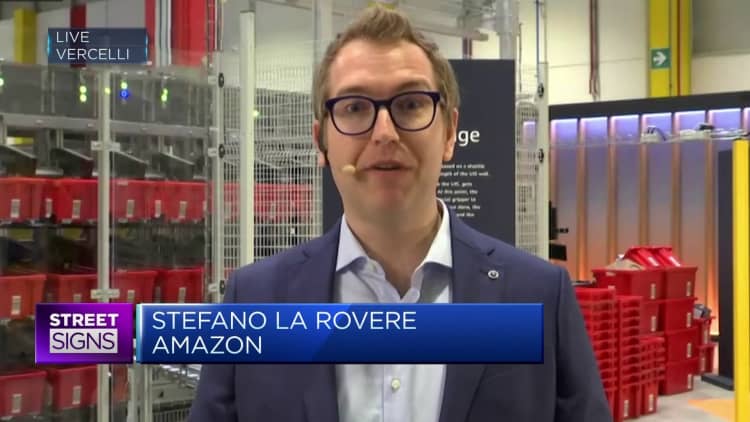Business
Trump Media shares plunge after company files to issue additional DJT stock

This photo illustration shows an image of former President Donald Trump reflected in a phone screen that is displaying the Truth Social app, in Washington, DC, on February 21, 2022.
Stefani Reynolds | AFP | Getty Images
Shares of Trump Media plunged more than 17% in premarket trading Monday after the company filed to issue millions of additional shares of stock.
Trump Media’s dramatic slide came as Donald Trump headed to a Manhattan court to begin jury selection for his criminal trial on hush money-related charges. Trump is the majority stakeholder in the company.
Trump Media, which created the Truth Social app and trades under the stock ticker DJT on the Nasdaq, fell nearly 20% last week.
The company’s intent to issue more common stock was made public Monday morning in a “preliminary prospectus” filed to the Securities and Exchange Commission. The shares cannot be issued until a registration statement with the SEC goes into effect.
The filing describes a plan to offer more than 21.4 million shares of common stock, issuable “upon the exercise of warrants,” the filing shows. Stock warrants give their holder the ability to buy shares at a predetermined price within a certain time frame.
The closing price of Trump Media’s warrants was $13.69 as of Friday, according to the filing. The warrants are being traded on the Nasdaq under the ticker “DJTWW.” That ticker was down more than 8% before the market opened Monday.
The company also seeks to offer the resale of up to 146.1 million shares of stock from “selling securityholders,” 114.8 million of which are held by Trump himself. Trump owns 78.8 million shares of the company, and stands to obtain 36 million “earnout shares” if the stock stays above a certain price for enough trading days.
This is breaking news. Please check back for updates.
Business
How generative, ChatGPT-like AI is accelerating humanoid robots

Shenzhen-based LimX Dynamics shows off one of its humanoid robots.
Limx Dynamics
BEIJING — ChatGPT-like artificial intelligence is speeding up research and bringing humanoid robots closer to reality in China, home to many of the world’s factories.
AI has been around for decades. What’s changed with the emergence of OpenAI’s ChatGPT chatbot is the ability of AI to better understand and generate content in a human-like way. While the U.S.-based tech is not officially available in China, local companies such as Baidu have released similar chatbots and AI models.
In robotics, the development of generative AI can help machines with understanding and perceiving their environment, said Li Zhang, chief operating officer of Shenzhen-based LimX Dynamics.
About three months after joining the two-year-old startup, Li said he shortened his expectations for how long it would take LimX to produce a humanoid robot capable of not just factory work, but also helping out in a households.
Li originally expected the entire process to take eight to ten years, but now anticipates some use cases will be ready in five to seven years. “After working for a few months, I saw how various tools’ abilities were improved because of AI,” he said in Mandarin, translated by CNBC.
“It has accelerated our entire research and development cycle,” he said.

Companies are rushing into the opportunity. OpenAI itself is backing humanoid robot startups, while Elon Musk’s Tesla is developing its own, called Optimus.
Electric car giant BYD last year invested in Shanghai-based Agibot just months after its founding, according to PitchBook.
And at a high level, Chinese state media in November published a photo of Chinese President Xi Jinping watching a humanoid robot at an exhibition center during his first trip to Shanghai since the pandemic. The robot was developed by Fourier Intelligence.
Before humanoid robots reach households, as LimX ultimately intends, factories can be a lucrative, enclosed scenario in which to deploy them.
China surpassed Japan in 2013 as the world’s largest installer of industrial robots, and now accounts for more than 50% of the global total, according to Stanford’s latest AI Index report.
Electronics, automotive and metal and machinery were the three leading sectors for industrial robot installation in China, the report said.
Impact on human jobs
When it comes fully replacing human workers, however, AI advancements alone aren’t enough.
Even if AI allows a robot to think and make decisions on par with humans, mechanical limitations are a major reason why humanoids can’t yet replace human laborers, LimX’s Li said.
One of LimX’s backers, Future Capital, has also invested in a company called Pan Motor that specializes in motors for humanoids.
Generative AI doesn’t directly help with robotic motion, pointed out Eric Xia, partner at Future Capital, an investor in LimX. But “advances in large language models can help humanoid robots with advanced task planning,” he said in Chinese, translated by CNBC.
LimX’s other investors include Lenovo Capital.
A shift toward factory robots can accelerate, once the cost-per-robot comes down.
Steve Hoffman, chairman of a startup accelerator called Founders Space, said he is working with a Chinese startup called Fastra, which he expects can begin mass robot production in one year. He said he spent time in China this year teaching local businesses how to integrate generative AI.
“We have already received six orders from research institutions,” he said, noting the startup aims to lower the cost per robot to between $50,000 to $100,000 by rollout.
“If we can hit a $50,000 price point, we can sell a lot of robots,” he said, pointing out the robots’ batteries can be charged as they work, 24 hours a day. “Could pay for the robot in a year.”
In pharmaceutical research, generative AI can reduce costs, without cutting into human labor.
“You don’t save costs in our business by having less people. You actually save costs by making fewer experiments that fail,” said Alex Zhavoronkov, chairman of the board, executive director and CEO of Insilico Medicine, which has offices in Hong Kong, New York and other parts of the world.
He noted how large pharmaceutical companies have typically had to spend thousands of dollars to replicate a molecule for testing — and would run a few thousand such tests per program. He claimed that with the help of AI, Insilico only needs to synthesize about 70 molecules per program.
The company published a paper in Nature in March claiming to have reached phase 2 clinical trials for an AI-generated drug.
Business
E-gate outage causing delays across UK airports

Heathrow, Gatwick and Manchester are among major airports impacted by a Border Force issue.
Source link
Business
Russia is shipping oil to North Korea above UN mandated levels


(This May 2 story corrects U.S. official’s quote to say annual cap is 500,000 barrels, not 500, in paragraph 3 and to say Ukraine, not North Korea, in paragraph 8)
By Steve Holland
WASHINGTON (Reuters) – Russia has been quietly shipping refined petroleum to North Korea at levels that appear to violate the mandates of the United Nations Security Council, a U.S. official said on Thursday, adding the U.S. is planning new sanctions in response.
The disclosure came on the first day after a U.N. panel of experts monitoring enforcement of longstanding U.N. sanctions against North Korea for its nuclear weapons and missile programs was disbanded after a Russian veto.
“At the same time that Moscow vetoed the panel’s mandate renewal, Russia has been shipping refined petroleum from Port Vostochny to the DPRK (North Korea). Russian shipments have already pushed DPRK imports above the 500,000-barrel annual cap mandated by the U.N. Security Council,” the U.S. official told Reuters, speaking on condition of anonymity.
The official said that in March alone, Russia shipped more than 165,000 barrels of refined petroleum to North Korea and that given the close proximity of Russian and North Korean commercial ports, Russia could sustain these shipments indefinitely.
Russia blocked the annual renewal of the panel in late March in what the U.S. official described as a calculated move by Moscow to hide its own violations of UN Security Council resolutions.
The official said the United States will continue to impose sanctions “against those working to facilitate arms and refined petroleum transfers between Russia and the DPRK.”
remove ads
.
“We have previously worked to coordinate autonomous sanctions designations with our partners — including Australia, the European Union, Japan, New Zealand, the Republic of Korea, and the United Kingdom — and we will continue to do so,” the official said.
North Korea has been helping Russia in its war against Ukraine by supplying ballistic missiles.
-

 African History3 months ago
African History3 months agoBlack History Facts I had to Learn on My Own pt.6 📜
-

 African History4 years ago
African History4 years agoA Closer Look: Afro-Mexicans 🇲🇽
-

 African History1 year ago
African History1 year agoPROOF AFRICAN AMERICANS AIN'T FROM AFRICA DOCUMENTED EVIDENCE
-

 African History2 years ago
African History2 years agoHow Did Normal Medieval People Survive Winter? | Tudor Monastery Farm | Chronicle
-

 African History3 years ago
African History3 years agoThe Entire History of Africa in Under 10 Minutes – Documentary
-

 African History3 years ago
African History3 years agoWhat happened to the many African Kingdoms? History of Africa 1500-1800 Documentary 1/6
-

 African History2 years ago
African History2 years agoAFRO MEXICO: Black History In Mexico!
-

 African History1 year ago
African History1 year agoA Black African King in Medieval European Art



































